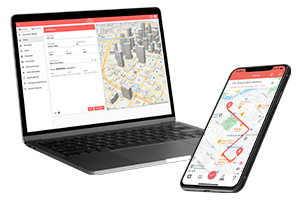Last updated on April 19, 2024
Well, hello there, savvy business owner, freelancer, or gig worker!
Ever felt like you’re shelling out too much on taxes? Have you ever gazed at your vehicle and thought, “Hey, can’t I get a tax break for all the miles I’ve clocked for work?”
If so, you’ll want to know all about mileage tax deductions in 2024.
Well, you’re in luck! This article is going to be your roadmap to understanding the mileage tax deduction. So buckle up and enjoy the ride!

Mileage Tax Deduction: What’s the Big Deal?
Think of the mileage tax deduction as a little gift from Uncle Sam. It’s a way to reduce your taxable income, and therefore, your tax bill. The IRS allows you to claim deductions for miles driven for business purposes.
Deductions work by reducing the amount of income that is subject to tax. For every eligible expense you claim, your taxable income lowers, which can decrease how much you owe in taxes or increase your refund. Essentially, deductions can provide significant financial relief, making it crucial to understand what can be deducted and how.
When it comes to mileage deductions, the IRS allows you to write off certain costs associated with business use of your vehicle. This is not just limited to the gas you use; it also includes wear and tear (depreciation), insurance, repairs, and more depending on the method you choose.
For anyone using their vehicle for business, understanding and leveraging mileage deduction is essential. This can be particularly beneficial for freelancers and gig workers, such as Uber drivers or freelance photographers, who rely heavily on their personal vehicle for work.
Now, there are two ways you can calculate your mileage deduction – the Standard Mileage Rate and the Actual Expenses Method. Intrigued yet?
Standard Mileage Rate: The Easy-Peasy Way
Under the Standard Mileage Rate, you simply multiply the number of miles driven for business by the rate set by the IRS. Now, don’t get your hopes too high – your daily commute doesn’t count. But, the miles you drive to meet clients, pick up supplies, or any other business-related activity are fair game.
It’s straightforward, and you don’t need to keep track of all those pesky receipts. However, remember that rates change, so it’s essential to stay updated. The standard mileage rate for 2024 has been set by the IRS at 67 cents per mile for business use. The IRS mileage tax deduction website is your friend here, since it extensively explores this topic.
Actual Expenses Method: For the Detail-Oriented
The Actual Expenses Method is the second approach. Here, you can deduct the actual costs of operating your vehicle for business. We’re talking gas, oil, repairs, servicing, tires, insurance premiums, car registration fees, and even licensing fees. Heck, you can even include vehicle depreciation!
But here’s the catch – you need to maintain meticulous records. Thankfully, with MileageWise’s Expense Tracker, that daunting task becomes a breeze. It’s the perfect solution to your record-keeping challenges.
So, Which One To Choose?
Choosing between the Standard Mileage Rate and the Actual Expenses Method depends on your circumstances.
Love the simplicity and hate paperwork? The Standard Mileage Rate might be your best bet.
But if you’ve had a year of high expenses – say, major repairs or high gas prices – or you’re driving a luxury car, the Actual Expenses Method might save you more.
Meet Your New Best Friend For Your Mileage Tax Deduction: MileageWise
Let’s be real, keeping track of mileage and expenses can be a headache.
Enter MileageWise, your new favorite app & web dashboard. MileageWise makes tracking your mileage and expenses a breeze.
With features like Google Timeline import, you can easily import your routes directly into the app. The AI Wizard function can even help fill in the gaps in your mileage log by recommending realistic trips, ensuring you don’t miss out on any potential deductions.
Even better, MileageWise offers a Retrospective mileage log creation feature, perfect for those who may have been a bit lax in their record keeping.
Additional features to help you maximize your deductions
- Built-in IRS Auditor: MileageWise features an integrated IRS Auditor that examines mileage logs to ensure they adhere to IRS standards. This function identifies up to 70 possible mistakes or inconsistencies in historical logs and proposes corrections to avoid issues during tax audits.
- Automatic Trip Classification: This functionality enables users to effortlessly classify trips as business or personal through predefined rules. It streamlines the documentation process and ensures accurate reporting for taxation or reimbursement purposes.
- Mass Distance Calculation: This powerful tool streamlines the process of calculating extensive mileage data with pinpoint accuracy. Whether you’re managing a fleet or just keeping track of personal trips, our system ensures that every mile is accounted for efficiently. With Mass Distance Calculation, users can rest assured that they’re maximizing their mileage deductions or reimbursements with minimal effort.
- Vehicle-Client Pairing: Tailored to meet the needs of professionals who visit multiple clients, this feature simplifies logging by associating specific vehicles with particular clients or projects. This not only enhances the accuracy of your travel records but also provides insightful data that can help optimize your travel routes and schedules.
- Data in the Cloud: This feature offers the flexibility to manage your mileage logs across multiple devices seamlessly. With top-tier security measures in place, your data is always protected and readily accessible, giving you peace of mind.
And if you need a little extra help, MileageWise’s Mileage Log Tax Preparation Service is there to assist. Essentially, MileageWise is like having a personal assistant to ensure you make the most of your mileage tax deduction.
Download MileageWise’s automatic mileage tracker app from Google Play or the App Store & try it for free for 14 days. No credit card is required!

A Word to the Wise: Recordkeeping
Whether you choose the Standard Mileage Rate or the Actual Expenses Method, keep good records. You don’t want to face an IRS mileage tax deduction audit without your paperwork in order. It’s like going to a gunfight armed with a spoon!
Mileage Tax Deduction: Making the Most of It
So, you’ve chosen your method and kept good records.
Great job! Now comes the fun part – claiming your mileage tax deduction and watching your tax bill shrink. Trust me, it’s a sight more beautiful than a sunset on a Caribbean beach.
To claim your deduction, you’ll need to fill out Schedule C of Form 1040. This form is your best friend during tax season. It’s where you report your income and expenses from your business.
When filling out the form for your tax return, you’ll need to accurately report several types of financial information:
- 1099 Income: This is the income reported on any 1099 forms you receive, which document the money you earned as an independent contractor.
- Other Income: This includes all other income streams relevant to your business that might not necessarily be captured on a 1099 form.
- Mileage: Report the total miles driven for business purposes over the year and the amount you’re claiming per mile. Whether you use the standard mileage rate or actual expenses, you’ll need a comprehensive log of your business-related trips.
- Other Deductible Expenses: Besides mileage, you can claim other costs associated with your business, such as advertising, mortgage, insurance, home office expenses, supplies, and equipment necessary for your work.
These components are critical for accurately and legally reducing your tax burden, so ensure your records are thorough and organized.
Wrapping Up: The Mileage Tax Deduction Magic
In conclusion, mileage tax deductions can be a real game-changer for business owners, freelancers, and gig workers. Whether you choose the Standard Mileage Rate or the Actual Expenses Method, you have the potential to save big on your taxes.
But remember, good record-keeping is crucial. With MileageWise, you can easily track your mileage and expenses, ensuring you maximize your deductions. It’s like having a secret weapon in your tax-saving arsenal.
So, go ahead, drive that extra mile for your business, meet that client, and pick up those supplies.
And remember, every mile counts!
FAQs
What is a tax year?
A tax year refers to the 12-month period for which tax returns are prepared and is the period over which income and expenses are reported to the IRS. For most individuals in the United States, the tax year corresponds to the calendar year, starting on January 1 and ending on December 31. Businesses, however, may have a fiscal year that differs from the calendar year, depending on their specific accounting practices.
What does “maximize deductions and credits” mean?
Maximizing deductions and credits means strategically taking full advantage of all the tax deductions and credits available to reduce your taxable income and overall tax liability. Deductions lower the amount of income that you are taxed on, while credits reduce your tax bill directly. Maximizing these can significantly decrease how much you owe in taxes or increase a potential refund.
How to deduct business expenses?
To deduct business expenses on your taxes, you must ensure that the expenses are both ordinary and necessary for your business operations. This includes keeping detailed records and receipts of all expenditures. Business expenses are reported on Schedule C of Form 1040 for sole proprietors and single-member LLCs. Deductions might include home office expenses, supplies, mileage, and more. Accurately categorizing and documenting these expenses throughout the tax year is crucial.
How does the mileage tax deduction work?
The mileage tax deduction allows businesses and self-employed individuals to deduct vehicle expenses for business use. There are two methods to calculate this deduction: the Standard Mileage Rate, where you multiply the business miles driven by the IRS-approved rate; and the Actual Expenses Method, where you deduct the actual costs of operating the vehicle for business, including gas, oil, repairs, and depreciation. You must keep meticulous records, including mileage logs, to substantiate your deduction.
In what states can you deduct vehicle registration fees?
Vehicle registration fees are deductible on your federal tax return only if they are calculated based on the vehicle’s value. These fees are considered personal property taxes. The deductibility can vary based on how your state structures its registration fees. States with value-based fees include California, Minnesota, and Arizona. It’s essential to check whether your state’s method of calculating vehicle registration fees qualifies them as deductible personal property taxes.
Is auto loan interest tax deductible?
Auto loan interest is not typically deductible on personal vehicles. However, if the vehicle is used for business purposes, you can deduct the portion of the interest that corresponds to the business use of the vehicle. This would be calculated based on the percentage of total mileage that is dedicated to business activities.
Is gas deductible on taxes?
Gas can be deductible as a part of the Actual Expenses Method for calculating the mileage deduction if the vehicle is used for business purposes. This includes only the gas used for business trips, not personal use. Alternatively, if using the Standard Mileage Rate, gas costs are factored into the rate provided by the IRS, thus not separately deductible.
Are tolls tax deductible?
Yes, tolls paid while driving for business purposes can be deducted as travel expenses. This is true whether you’re using the Standard Mileage Rate or the Actual Expenses Method.
Are car repairs tax deductible?
Yes, car repairs are deductible if the vehicle is used for business purposes and the expenses are part of the Actual Expenses Method. You must allocate costs between personal and business use if the vehicle is used for both.
Is auto interest tax deductible?
Similar to auto loan interest, the interest on a vehicle can be deductible if the vehicle is used for business purposes. Only the business-use portion of the interest is deductible.
Are parking tickets tax deductible?
No, parking tickets are not deductible. Penalties and fines resulting from violations of law (including parking tickets) are not deductible for federal tax purposes.
Are accounting fees tax deductible?
Yes, accounting fees that are directly related to operating your business, managing business finances, or preparing business tax returns are deductible as business expenses. These would typically be reported on Schedule C if you are self-employed.
What counts as a deductible business drive? Are commuting miles deductible?
Any drive you make for business purposes other than commuting to your regular workplace can be counted as a deductible business drive.
Can I claim both the standard mileage rate and actual expenses?
No, you must choose one method. However, you can change the method from year to year.
What records do I need to keep for the mileage tax deduction?
Keep a record of the date, miles driven, and the purpose of each trip. If using the Actual Expenses Method, also keep receipts for all vehicle-related expenses.
Where do I claim my mileage tax deduction on my tax return?
You’ll report your mileage expenses on Schedule C of Form 1040.
How can MileageWise help me with my mileage tax deduction?
MileageWise offers features like route import, forgotten trip fill-ins, retrospective mileage log creation, and the mileage log preparation service, making tracking mileage and expenses easier.
Remember, with MileageWise at your service, there’s no room for failure when it comes to maximizing your mileage tax deduction. Each business-related mile you drive, tracked by MileageWise, translates into money in your pocket. Enjoy your journey!



